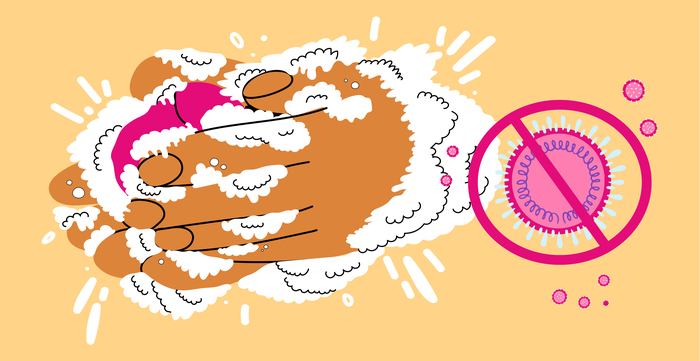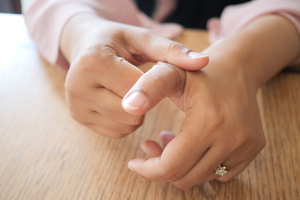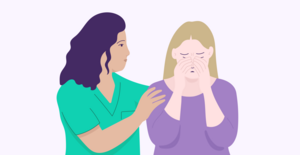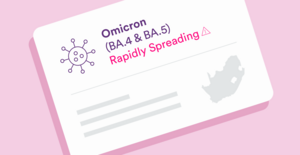Key points
- COVID-19 habits worth keeping include regular hand washing, staying up to date on vaccines, staying home when sick, and maintaining distance from those showing signs of illness.
- Other beneficial habits include exercising at home, cooking healthy meals, using online care, and prioritizing mental health.
- Some COVID-19 precautions can be discontinued, such as disinfecting surfaces, wearing gloves, and extended quarantining.
- Unhealthy habits to be avoided include daily drinking, stress eating, doom scrolling, and skipping preventive care screenings.

COVID made us rethink our daily routines to keep from getting sick and to protect others from the virus. But with more people vaccinated and COVID cases dropping, it’s a good time to revisit the habits we picked up during the pandemic and decide which ones we should keep and which ones we can say goodbye to.
What COVID habits should I still practice?
“There are many healthy precautions we learned and practiced during COVID that go a long way to prevent illness,” said Joe Bailey, Medical Director for Indigo Health. “With flu season upon us and a possible COVID surge this fall and winter, it’s important to continue those good habits.”
Here are some COVID prevention measures worth keeping up according to the CDC:
- Hand washing, the right way. According to the CDC, regular handwashing is the best way to remove germs, avoid getting sick and prevent the spread of illness to others. Why stop now? If you don’t remember the 20-second drill, the CDC offers excellent handwashing guidelines. “Handwashing is such an easy thing to do, but I think people have become less diligent in recent months,” Joe Bailey said. “Good hand hygiene is the cornerstone of illness prevention and a simple way to cut transmission of other viruses and bacteria.”
- Staying up to date on vaccines. As we learned with COVID, vaccines are the first line of defense to protect you against illness, and it’s more important than ever to make sure you’re up to date.
- The COVID-19 vaccine significantly lowers your risk of severe illness, hospitalization and death if you get infected. For those fully vaccinated and boosted, a new COVID booster arrives this fall that provides added protection against the new variants.
- “Flu vaccines are recommended for everyone 6 months and older,” Joe Bailey said. “This year’s vaccine protects against four strains of the flu and is by far the best way to protect against the virus and severe illness.” The CDC recommends getting your flu vaccine in September or October, and it’s safe to receive your COVID-19 Booster at the same time!
- Staying home when you’re sick. COVID taught us that staying at home when you’re sick and avoiding contact with others is one of the best ways to prevent the spread of illness at work, school, social events and other public places.
- Keeping your distance. While COVID distancing guidelines have eased, it’s still a good idea to give yourself at least six feet of space between you and someone who is coughing, sneezing or showing other signs of illness, the CDC advises.
- Exercising at home and/or in the great outdoors. Whether you invested in an exercise bike or a good pair of walking shoes, or organized an outdoor neighborhood yoga class, there’s no reason to shutter your home gym or discontinue your daily exercise regimen. If you’ve made the investment in equipment, that’s a great motivator to keep up your routine. And there’s no better place to get in your steps than on a forested path, tree-lined sidewalk or in the garden.
- Cooking at home/eating healthy. With restaurants closed and families at home, we all tried new recipes, connected around the dining room table, and opted for meals that were healthier than restaurant or fast-food offerings – some prepared with ingredients fresh out of home gardens. Sustaining those healthy habits is a great way to boost your immune system and protect against illness.
- Tapping into online care. During COVID, virtual visits became a necessary option for medical providers across the county. Pandemic or not, when you need medical care, it isn’t always convenient to squeeze in an appointment. With online care, it’s easy to get the urgent and primary care you need on your schedule – from home or office, on campus or on the road.
While not directly a COVID prevention measure, making mental health a priority should continued to be practiced. From navigating online work and school to worrying about our own health and the health of loved ones, COVID has taken a toll. It’s also brought to light that mental health is a crucial part of overall health. “If you or a loved one feels overwhelmed, anxious, tired or depressed, you’re not alone,” said Joe Bailey. Fortunately, mental health care services are now more accessible than ever. If you’re struggling, talk with a health care provider.”
Should I still wear a mask?
In spring 2022, the CDC eased its masking recommendations. People are now advised to wear masks if they live where community transmission is deemed high or if a person is at risk of severe illness.
While face coverings are generally no longer required in most places, it’s important to consider your personal comfort level when it comes to masking. If you feel better wearing one, there’s no reason to give it up. And you’ll be adding an extra layer of protection and further reduce your chances of getting a serious case of COVID-19. Even if you’re fully vaccinated and boosted, breakthrough cases are possible.
“Masks work, and not just for COVID but for the flu as well,” Joe Bailey said. “Wearing a well-fitting N95, KN95 or KF94 mask in crowded indoor areas will reduce your likelihood of getting sick.”
What COVID habits are safe to discontinue?
Some COVID precautions that were once necessary are now safe to set aside, according to the CDC, including:
- Disinfecting surfaces. Remember about a million years ago at the beginning of the pandemic when it was the norm to continually wipe down groceries, takeout containers and everything else in sight? What we’ve learned since then is that COVID doesn’t survive well on surfaces, so there’s a low risk of spread from food packaging or products.
- Wearing gloves. That gas pump might still seem gross, but the CDC says wearing gloves is not necessary for protection from COVID-19 in most situations. It is recommended that you wear gloves if you’re cleaning or caring for someone who is sick.
- Extended quarantining. In August, the CDC streamlined its guidance around what to do if you’re exposed to COVID or get sick or test positive for the virus.
- If you are exposed to COVID-19, you should wear a high-quality mask for 10 days and get tested on day 5.
- If you test positive for COVID-19, you should stay home for at least 5 days from when your symptoms began and isolate yourself from others in your home. If after 5 days you are fever-free for 24 hours without the use of medication, and your symptoms are improving, or you never had symptoms, you may end isolation after day 5.
- Regardless of when you end isolation, you should avoid being around people who are at high risk of getting very sick from COVID-19 for at least 10 days.
Some not-so-great habits that should go by the wayside
Along with measures we took to keep safe, we also picked up some unhealthy habits along the way to help us cope. Here are some that should be dialed back, according to the CDC:
- Daily drinking/habitual happy hours. When stay-at-home orders were put in place, alcohol use soared. Today, many people are still consuming more than they should. That can have serious health consequences, including high blood pressure, heart and liver disease, sleep disturbances, depression and more. Drinking too much alcohol can also weaken the immune system, increasing the chance of getting sick, according to the CDC.
To reduce the risk of alcohol-related health issues, Dietary Guidelines for Americans recommend that adults moderate their intake to two drinks or less a day for men or one drink or less a day for women on days when alcohol is consumed. - Stress/comfort eating. Amid the disruption of COVID, many people turned to food. When the body is stressed, it sometimes goes into flight or fight mode, which can make us crave quick-energy foods like pasta, bread and sweet desserts. Extra weight that comes with emotional eating can increase the risk of health problems, such as heart disease, stroke, diabetes, cancer and depression, notes the CDC.
- Doom scrolling. Most of us were glued to our devices during COVID, especially during the early days of the pandemic. But there’s a fine line between staying informed and falling into a harmful habit. The continual consumption of negative news can increase anxiety, stress and depression, and impact your sleep.
- Skipping preventive care screenings and appointments. According to the CDC, it’s estimated that nearly 41 percent of U.S. adults avoided medical care during the pandemic because of concerns about COVID-19. Now is the time to get routine care back on track, including regular physical exams, health screenings, diagnostic testing and nonurgent treatment for medical or mental health conditions.
If you’re having difficulty breaking unhealthy COVID habits, schedule a visit with a health care provider.
FAQs
What are some COVID-19 habits that are still recommended?
Regular hand washing, staying up to date on vaccines, staying home when sick, maintaining distance from those showing signs of illness, exercising at home, cooking healthy meals, using online care, and prioritizing mental health are all habits that are still recommended.
Are there any COVID-19 precautions that can be discontinued?
Yes, disinfecting surfaces, wearing gloves, and extended quarantining are precautions that can be discontinued according to the CDC.
What are some unhealthy habits picked up during the pandemic that should be avoided?
Unhealthy habits to be avoided include daily drinking, stress eating, doom scrolling, and skipping preventive care screenings.
Should I still wear a mask?
The CDC advises people to wear masks if they live where community transmission is high or if a person is at risk of severe illness. It's also a personal choice for added protection.
What should I do if I'm having difficulty breaking unhealthy COVID habits?
If you're struggling with breaking unhealthy habits picked up during the pandemic, it's recommended to schedule a visit with a healthcare provider.
How important is mental health in the context of the COVID-19 pandemic?
Mental health is extremely important, especially during the COVID-19 pandemic. The pandemic has taken a toll on many people's mental health, and it's crucial to seek help if you or a loved one feels overwhelmed, anxious, tired, or depressed.
Is it safe to get the COVID-19 booster and the flu vaccine at the same time?
Yes, according to the CDC, it's safe to receive your COVID-19 Booster and flu vaccine at the same time.
How can I maintain good hand hygiene?
Good hand hygiene can be maintained by regular hand washing, ideally for 20 seconds each time. This is the best way to remove germs, avoid getting sick, and prevent the spread of illness to others.









